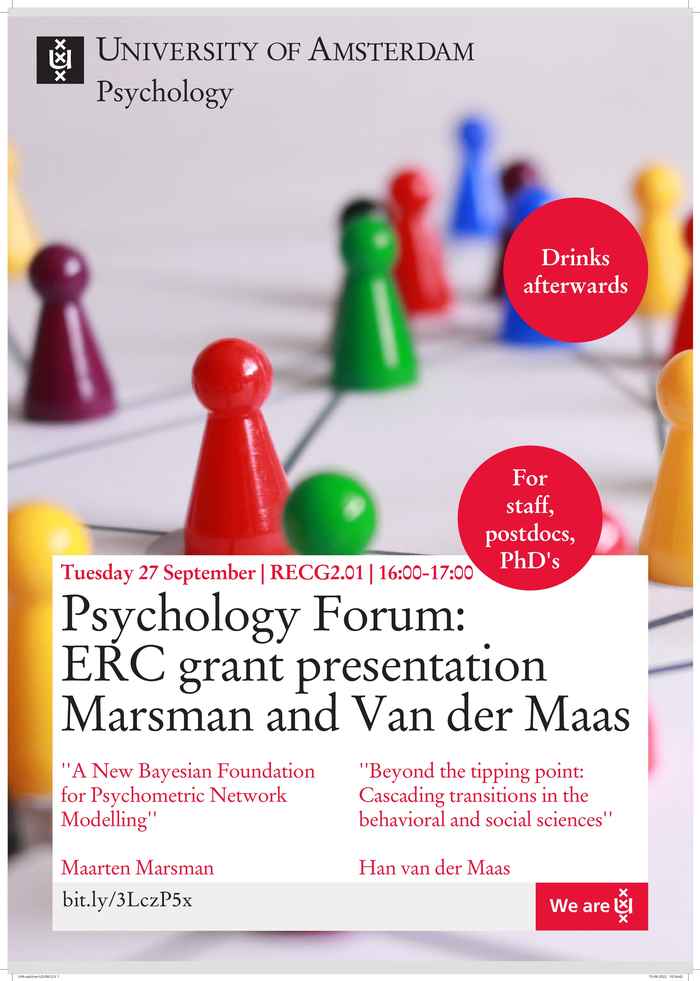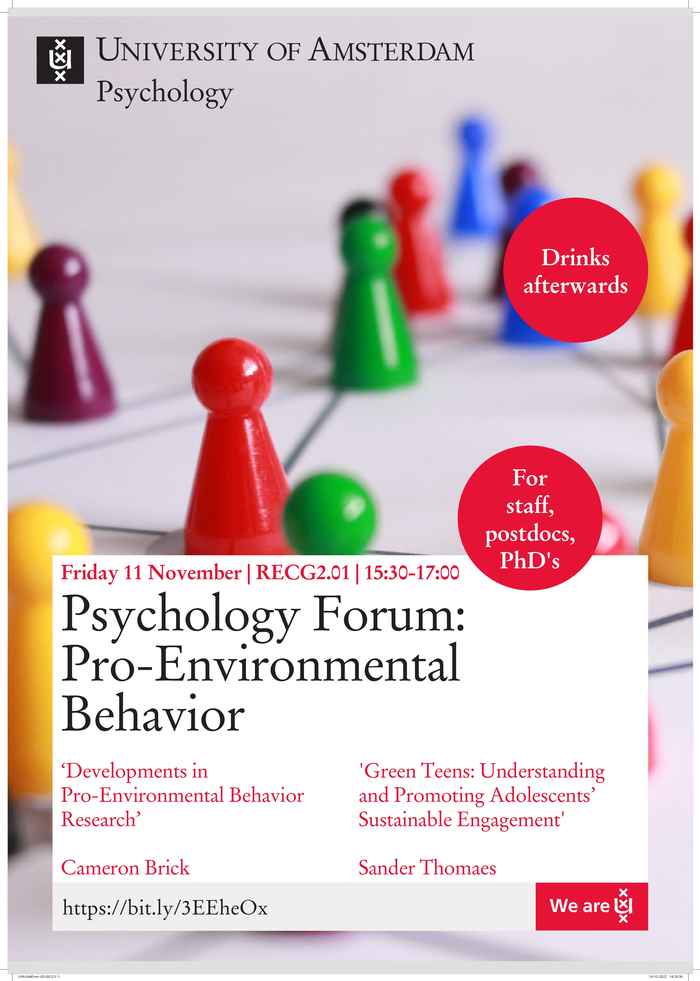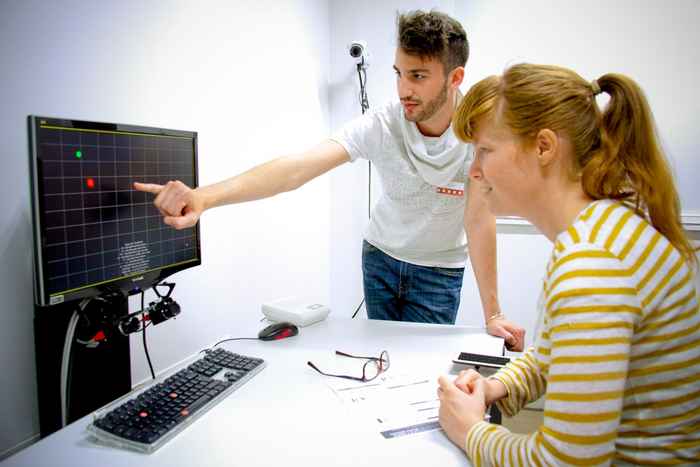Psychology Forum
Psychology Research Institute / PsyRes
-
Psychology Forum #1: Running on-line studies | Bastiaan Rutjens & Jaap Murre
Running on-line studies is one efficient way to run studies with absolute social distancing, however, not everybody knows how do this (yet). During this tutorial you will hear how to set up and run studies on-line. Bastiaan Rutjens will talk about the practicalities and pitfalls of running studies on-line, and will discuss different platforms to recruit participants and to make sure that you gather high-quality data.
For those who want to move their experimentation online, NeuroTask Scripting is a good option to consider. Jaap Murre will give a brief demo of some of the possibilities.
The aim is that the tutorial is accessible for people who have never done an on-line study, but also for people who can share their experience. Besides the speakers, several experienced on-line researchers and the people from the TOP will also be available to answer questions.
Bastiaan Rutjens (with Natalia Zarzcecna)
“Conducting research online using US and UK data markets”
In the last 2-3 years I have almost exclusively conducted my research online. Online research works well for correlational work, simple experiments, as well as various types of longitudinal design. There are various online platforms where researchers can crowdsource participants for their research. We will talk about our experiences with Amazon’s Mechanical Turk (US) and Prolific Academic (UK), focusing on participant selection, population demographics, instruction and attention checks, and data quality (e.g., compared to student samples).
Jaap Murre
For those who want to move their experimentation online, NeuroTask Scripting is a good option to consider.
When Psychology staff or students register at neurotask.com using heir uva.nl email, they will automatically gain full access to NeuroTask Scripting for free. This is a platform to create online experimental tasks. The NeuroTask framework is not intended for beginning casual users who want to ‘drag-and-drop’ an experiment; some programming in JavaScript is required. Having said that, simple experiments can be created in minutes or hours and quite sophisticated tasks have been made in the past five years, including reaction time experiments (e.g., IAT), memory tests, IQ tests, experiments with sound or video, game-like experiments, multi-player experiments, speech-based interaction, etc. See the demo page for runnable examples, which can be used as starting points. There is also a free online book that takes beginners step-by-stop through the process of creating experiments. Recently, a student has created a number of introductory videos.
Psychology Forum #1: Running on-line studies | Pychology Research Institute | University of Amsterdam -
Psychology Forum #2: A Network Perspective | Sacha Epskamp
In this Psych Forum we will have two excellent speakers that will provide a network perspective on the psychometrics and the brain.
Sacha Epskamp | Network Modeling of Feelings Cognition and Behavior: An Introduction to Network Psychometrics
In this talk I will introduce "network psychometrics" - an increasingly popular field of methods pioneered at the Psychological Methods program group aiming to map out the complex interplay between observed variables. I will present the theoretical foundations for network psychometrics show how such an analysis can be performed in R and discuss future directions in this area of research.
Psychology Forum #2: A Network Perspective | Pychology Research Institute | University of Amsterdam -
Psychology Forum #3: What's your prior? | Angelika Stefan & Julia Haaf
Many researchers are aware of the many benefits it can have to switch from classical statistics to Bayesian. And yet, almost as many are hesitant to do the switch, and all because of the priors! In Bayesian analysis, researchers must make a priori commitments, and these commitments are made transparently as part of model specification.
During this Psychological Forum you will learn about several ways to specify these a priori commitments. In the first talk, Julia Haaf will give an introduction to prior specification and the sometimes complicated terminology used around it. We will show which priors are appropriate for Bayesian estimation or Bayesian model comparison, and explain what a sensitivity analysis is.
In the second talk, Angelika Stefan will discuss different approaches that can be used to formulate priors based on existing pre-data knowledge. Specifically, we will show how results from the scientific literature, theoretical convictions, and domain expert knowledge can shape prior distributions. We will present several concrete examples, and discuss how the formulation of the prior distribution influences the results of Bayesian analyses. There will be lots of time for discussion and to ask questions. Share your favorite priors, or discuss analysis problems where you did not know which priors to chose.
Psychology Forum #3: What's your prior? | Pychology Research Institute | University of Amsterdam -
Psychology Forum #4: On Social Media | Christin Scholz, Hang-Yee Chan, Tim van Timmeren
Psychology Forum #4: On Social Media | Pychology Research Institute | University of AmsterdamPsychology Forum #4: On Social Media | Pychology Research Institute | University of Amsterdam
Using social media in psychological science, and the psychology of social media use
In this forum we address the use of social media data to study psychological processes using high definition real world data, but also address the psychology of social media use, that is the impact of digital detox on well-being. These two talks highlight the novel ways in which social media is starting to play a role in psychological science.
Connecting Social Media Digital Trace Data and Neuroimaging to Understand Mechanisms of Real-World Behavior + Trace data tutorial.
Christin Scholz, PhD
In modern digital societies, social media facilitates and shapes social relationships and the spread of information between individuals and through entire populations. Whenever users engage with or on social media, they leave digital traces indicating, for instance, when they were active, who or what content they interacted with. As such, social media offers opportunities for unobtrusive, rich observations of naturalistic, real-life experiences and behaviors. This talk uses examples of our recent work to explore how this observational data can be used to enrich highly controlled, laboratory investigations into the psychological mechanisms that drive human decision-making and behavior. Linking these diverse data sources can enable researchers to combine the best of multiple worlds: the naturalistic, large-scale, and dynamic properties of social media digital trace data and the internally valid, precise information provided by laboratory experiments.
Hang-Yee Chan, PhD
Social media digital trace data provide many opportunities to researchers, but also come with specific challenges and limitations like any source of data. This talk uses examples from our recent work to demonstrate how social media digital trace data can be linked to laboratory data in order to investigate psychological mechanisms of real-world behavior.
‘Digital detox’: the effect of abstinence on social media use, habits and wellbeing
Tim van Timmeren
Many people want to reduce their social media use and an increasingly popular intervention to regain control is a ‘digital detox’. We recruited 120 participants motivated to reduce usage and found that a simple one-week detox significantly reduces social media use, automaticity and craving up to three weeks post-detox, while improving mental wellbeing.
-
Psychology Forum #5: On polarisation | Frederic R. Hopp & Marte Otten
This online forum addressed the topic of (political) polarisation and comprised two lectures:
- Morally Polarised Perception: Current Efforts to Examine Neural Patterns of Political Polarisation by Frederic R. Hopp, PhD
- How (political) convictions can change basic cognition: A predictive processing approach by Marte Otten, PhD
Psychology Forum #5: On polarisation | Pychology Research Institute | University of AmsterdamPsychology Forum #5: On polarisation | Pychology Research Institute | University of Amsterdam -
Psychology Forum #6: ERC grant presentation | Maarten Marsman & Han van der Maas
Maarten Marsman and Han van der Maas both presented their ERC grant projects. Marsman was granted an ERC grant for his proposal A New Bayesian Foundation for Psychometric Network Modelling and Van der Maas for Beyond the tipping point: Cascading transitions in the behavioral and social sciences.

-
Psychology Forum #7: Promoting pro-environmental behaviour | Cameron Brick & Sander Thomaes

On this edition of the Psychology Forum Cameron Brick and Sander Thomaes discuss their research on pro-environmental behaviour and sustainable engagement among teenagers.
Cameron Brick | Developments in pro-environmental behaviour research
An increasing range of psychologists are engaging with environmental issues, whether doing primary research or reducing the environmental impact of departments and conferences. My group studies the motivations and social processes that predict pro-environmental behaviors such as political engagement and reducing meat consumption and flying.
My talk focused on the public opinion on climate change and how to measure and think about pro-environmental behavior. Most previous studies assumed that pro-environmental behavior is a psychological variable, but our work suggests behaviors are external, diverse, and have different causes. I also described new laboratory tasks with repeated, consequential environmental dilemmas and shared a resource of free, open psychological datasets. Last, I introduced a new non-profit journal in environmental psychology.
Sander Thomaes | Green Teens: Understanding and Promoting Adolescents’ Sustainable Engagement
The world faces an unprecedented environmental crisis, and human activity is its root cause. This poses a call to action for psychology. Young people, especially adolescents, have the potential to catalyze the transformative sustainable change that the world needs now. In the Greenteens research project, we are developing a new approach to understanding and harnessing adolescents’ potential for sustainable behavior change.
We posit that adolescents will be internally motivated to engage in sustainable behavior when they construe such behavior as a way to pursue their widely shared personal motives for autonomy and status. We also suggest that sustainability promoting policies (educational programs, campaigns) can be improved by using techniques that reshape how adolescents construe sustainable behavior—from a low-priority chore to an activity that embodies what they deeply care about. I presented our initial research to evaluate these hypotheses and identify the psychological forces that drive adolescents’ sustainable engagement.
-
Psychology Forum #8: Change-Ability for a World in Flux | Erik Rietveld

Speaker: Erik Rietveld
We are living in an era of accelerating social and environmental change, one that calls for greater change-ability: skilled ways of coordinating with a rapidly changing world. Yet people and the communities they form often find change hard to realize and sustain in their lives.
My VICI Change-Ability project, aims to open up a new perspective on change-ability, starting from the insight that what people do is both enabled and constrained by the affordances of their surroundings.
Affordances are possibilities for action provided by the living environment. Every activity from sitting in a chair to making architecture is enabled by affordances. Less recognized is the fact that affordances also constrain people’s ability to change what they do. Even when people know that excessive sitting is unhealthy, offices filled with desks and chairs make them less inclined to explore other possibilities.As philosophers we create a conceptual framework for understanding change-ability in affordance-based terms. We participate in and reflect on the making of artistic interventions that allow visitors to experience what it would be like to live in entirely different ways.
This is done at RAAAF, an internationally renowned, award-winning practice for visual art and experimental architecture, which Ronald Rietveld and I founded in 2006. I will show how affordance-based interventions in the living environment can increase openness to exploring unconventional possibilities that can spark behavioural change.
-
Psychology Forum #9: Social interactions in workplace meetings | Prof. Dr. Nale Lehmann Willenbrock

Meetings play a crucial role in shaping human experience and behavior within the work context. The rise of remote and hybrid work has led to a significant increase in the frequency of daily meetings for coordination and communication purposes, contributing to the phenomenon known as "zoom fatigue." This presentation argues that to enhance unavoidable workplace meetings, a deeper understanding of the intricate social dynamics occurring within these meetings is necessary.
Meetings as organising process
The talk positions meetings as central to the organising process and offers an overview of research focusing on interaction dynamics within workplace meetings. The emphasis will be on quantifying systematic behavioral patterns that impact meeting effectiveness and wellbeing outcomes.
Furthermore, the presentation discusses recent interdisciplinary work at the intersection of organizational psychology and computer science, aiming to automatically detect group dynamics in workplace meetings.
In conclusion, the talk provides insights into ongoing research that explores the use of virtual reality for creating more immersive meeting experiences in the Metaverse, potentially offering more rewarding interactions.
-
Psychology Forum #10: Sleep on it to ditch or deepen distress: why insomnia is the primary modifiable risk for emotional disorders | Prof. Eus van Someren
Sleep is an active brain state. Reactivation and synaptic plasticity in engrams (or ‘memory traces’) of prior wake experiences during subsequent sleep supports consolidation and adaptation of skills and episodic memory. Less considered is that the success of these processes determines the severity of emotional distress. This presentation gives clues on why sleep makes distress disappear overnight in good sleepers, yet fails to do so or can even be maladaptive by worsening distress overnight in insomnia, thus becoming the primary risk factor for emotional disorders. New insights call for moving insomnia research beyond psychology to the level of neuronal circuit-, cellular- and synaptic adaptations in order to understand and intervene on the most prevalent and burdening mental disorders.
-
Psychology Forum #11: Qualitative Research Methods in Psychological Research | Helle Larsen & Arjen Noordhof

In this Psych Forum, Helle Larsen and Arjen Noordhof discussed the value and feasibility of using qualitative methods in psychological research.
Helle Larsen discussed mixed-methods in psychological research, highlighting its iterative process for robust understanding and real-world applicability, with examples in intervention development and substance use. Arjen Noordhof explored the practical application of therapeutic concepts by psychotherapists, revealing pragmatic meanings through collaborations with students.
-
Psychology Forum #12: Bridging the gap between research and policy | Alessandro Tavoni & Ted Jan Post
In today’s world, many societal problems can benefit from a psychological angle: major global issues such as global health crises, climate change, and global inequality are all influenced by human behavior. However, to many academics, the gap between research-based recommendations and translation into practice remains wide: policy recommendations are often discussed in papers, but these insights might not always reach their target audience.
In this Psych Forum, Alessandro Tavoni (University of Bologna) and Ted Jan Post (UvA IAS/POLDER) discussed their policy-related research, as well as experiences and insights on collaborating with policymakers, and lessons for researchers looking to increase the impact of their work. Below you can find abstracts from the two speakers.
- Alessandro Tavoni, Professor of Environmental Economics, University of Bologna
'The net-zero transition poses unprecedented societal challenges that cannot be tackled with technology and markets alone. It requires complementary behavioral and social change on the demand side. Abandoning entrenched detrimental norms, including those that perpetuate the fossil-fueled lock-in, is notoriously difficult, preventing change and limiting policy efficacy. A nascent literature tackles social tipping interventions—STI, aiming at cost-effective disproportionate change by pushing behaviors past an adoption threshold beyond which further uptake is self-reinforcing. Intervening on target groups can greatly reduce the societal cost of a policy and thus holds promise for precipitating change. This presentation takes stock of the potential of STI to scale climate action by first reviewing the theoretical insights arising from behavioral public policy based on applications of threshold models from sociology and economics; then, it assesses the initial evidence on the effectiveness of STI, in light of the outcomes of laboratory and online experiments that were designed to study coordination on an emergent alternative to the initial status quo. Lastly, I've discussed potential conceptual limitations and fruitful avenues for increasing the robustness of STI assessments beyond theory and small-scale experimentation.'
- Ted Jan Post, Impact Manager at POLDER and SEVEN, UvA
Ted Jan is impact developer for two interdisciplinary initiatives at the UvA, respectively POLDER, housed at the Institute for Advanced Study and SEVEN, the new climate institute at the UvA. In his work he explores how to make impactful research, yet retaining academic curiosity and integrity. He talked about his experiences in shaping new research on complex systems together with policymakers and the lessons learned in connecting these worlds. What is needed to reach policymakers? And can a participatory method help you connect to stakeholders in a meaningful way?
Slides may not be copied without consent!